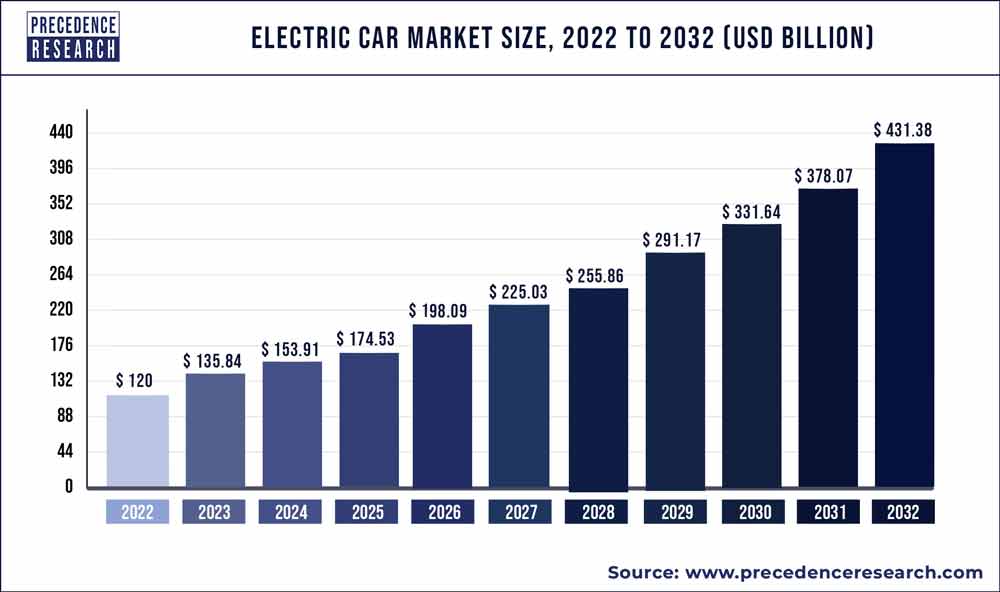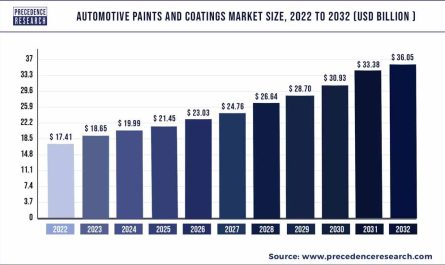The global electric car market size was valued at USD 135.84 billion in 2023 and is projected to be worth around USD 431.38 billion by 2032 with a CAGR of 13.7% from 2023 to 2032.

The electric car market has witnessed significant growth in recent years, driven by increasing concerns about environmental sustainability, advancements in battery technology, and government incentives promoting the adoption of electric vehicles (EVs). Electric cars, also known as electric vehicles (EVs), are automobiles that are powered either entirely or partially by electricity stored in batteries. This market segment has seen remarkable expansion globally, with numerous automakers investing heavily in electric vehicle development and production. The transition towards electric mobility represents a fundamental shift in the automotive industry, with the potential to revolutionize transportation and reduce greenhouse gas emissions.
Get a Sample: https://www.precedenceresearch.com/sample/2398
Growth Factors:
Several factors contribute to the growth of the electric car market. Firstly, growing awareness of environmental issues, such as air pollution and climate change, has led consumers and governments alike to seek cleaner and more sustainable transportation alternatives. Electric cars produce zero tailpipe emissions, making them an attractive option for eco-conscious consumers. Additionally, technological advancements in battery technology, including improved energy density and reduced costs, have made electric vehicles more practical and affordable. Moreover, stringent regulations aimed at reducing carbon emissions from vehicles have compelled automakers to invest in electric vehicle development to meet regulatory requirements and avoid penalties.
Region Insights:
The electric car market exhibits varying degrees of adoption and growth across different regions. Developed economies such as North America, Europe, and parts of Asia, including China, Japan, and South Korea, have emerged as key markets for electric vehicles. These regions boast robust infrastructure for electric vehicle charging, supportive government policies, and a strong consumer base interested in sustainable transportation solutions. In contrast, developing regions in Africa, Latin America, and parts of Asia face challenges such as limited infrastructure, high upfront costs, and a lack of awareness, hindering the widespread adoption of electric cars.
Electric Car Market Scope
| Report Coverage | Details |
| Market Size in 2023 | USD 135.84 Billion |
| Market Size by 2032 | USD 431.38 Billion |
| Growth Rate from 2023 to 2032 | CAGR of 13.7% |
| Base Year | 2022 |
| Forecast Period | 2023 to 2032 |
| Segments Covered |
|
Electric Car Market Dynamics
Drivers:
Several drivers are propelling the growth of the electric car market. Government incentives, including tax credits, rebates, and subsidies, play a crucial role in incentivizing consumers to purchase electric vehicles. Additionally, automakers are investing heavily in research and development to enhance the performance, range, and affordability of electric cars, making them more attractive to a broader range of consumers. Moreover, the establishment of charging infrastructure networks, both public and private, is addressing range anxiety concerns and facilitating the adoption of electric vehicles. Furthermore, increasing consumer awareness of the benefits of electric mobility, coupled with a growing emphasis on corporate sustainability, is driving demand for electric cars among individuals and fleet operators alike.
Opportunities:
The electric car market presents numerous opportunities for stakeholders across the value chain. For automakers, investing in electric vehicle production represents an opportunity to capitalize on the growing demand for sustainable transportation solutions and gain a competitive edge in the market. Similarly, suppliers of battery technology, charging infrastructure, and related components stand to benefit from the burgeoning electric vehicle market by offering innovative solutions to meet evolving customer needs. Furthermore, government agencies and policymakers have the opportunity to promote the adoption of electric vehicles through supportive policies, such as incentives for electric vehicle purchases, investments in charging infrastructure, and regulatory measures to phase out internal combustion engine vehicles.
Challenges:
Despite its promising growth trajectory, the electric car market faces several challenges that could impede its expansion. One significant challenge is the high upfront cost of electric vehicles compared to traditional internal combustion engine vehicles, primarily due to the cost of battery technology. Additionally, concerns regarding the availability and accessibility of charging infrastructure, particularly in rural and less developed areas, pose a barrier to widespread adoption. Range anxiety, or the fear of running out of battery charge while driving, remains a persistent concern for consumers, highlighting the need for further advancements in battery technology and infrastructure. Furthermore, the lack of standardization in charging protocols and connector types complicates the charging experience for electric vehicle owners, inhibiting seamless interoperability between different charging networks.
Read Also: Hyperloop Train Market Size to Hit USD 39.19 Bn By 2032
Recent Developments
- In the year 2021 March, Volvo introduced a new model as C40 recharge model and has the same functions and features as of XC60 model
- In the year 2021 April, Volkswagen opened up the 7 sweaters EV ID.6 cross and ID.6 X manufactured long with SAIC and FAW in China. Which includes 2 batteries that are 58 kWh and 77kWh.
- In the year 2022 January, Volkswagen launched the ID.5 model based on skods enayaq iV model and can run up to 300 miles on 1 charge.
Electric Car Market Companies
- Tesla (US)
- Volkswagen AG (Germany)
- SAIC Motors (China)
- BYD (China)
- Stellantis (Netherlands)
- Toyota Motor Corporation
- Honda Motor Co. Ltd
- Ford Motor Company
- Nissan Motor Corporation ltd
Segments Covered in the Report
By Product Technology
- Hybrid electric vehicles
- Plug-in hybrid vehicles
- Battery electric vehicles
By Components
- Motor
- Battery
- Fuel stack
- Controlling unit
- Humidifier
- Air Compressor
- Power Conditioner
- Fuel processor
- On board charge
- Other
By Vehicle Type
- Passenger cars
- Commercial vehicles
By Class
- Low price
- Medium price
- Luxury
By Speed
- More than 125MPH
- Less than 125MPH
By Drive Type
- Front wheel drive
- Rear wheel drive
- All wheel drive
By Charging Point
- Normal charging
- High charging
By Connectivity
- V2X
- V2V
- V2G
- V2B or V2H
By Propulsion
- PHEV
- BEV
- FCEV
By Application
- Consumer Electronics
- Military
- Public transportation
- Aviation
- Electricity grid
- Spaceflight
- Military
- Wearable technology
By End User
- Commercial Fleets
- Private
By Geography
- North America
- Europe
- Asia-Pacific
- Latin America
- Middle East & Africa (MEA)
Contact Us:
Mr. Alex
Sales Manager
Call: +1 9197 992 333
Email: sales@precedenceresearch.com
Web: https://www.precedenceresearch.com
Blog: https://www.expresswebwire.com/
Blog: https://www.uswebwire.com/
Blog: https://www.dailytechbulletin.com/

